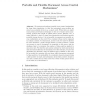Free Online Productivity Tools
i2Speak
i2Symbol
i2OCR
iTex2Img
iWeb2Print
iWeb2Shot
i2Type
iPdf2Split
iPdf2Merge
i2Bopomofo
i2Arabic
i2Style
i2Image
i2PDF
iLatex2Rtf
Sci2ools
123
click to vote
ESORICS
2004
Springer
2004
Springer
Portable and Flexible Document Access Control Mechanisms
We present and analyze portable access control mechanisms for large data repositories, in that the customized access policies are stored on a portable device (e.g., a smart card). While there are significant privacy-preservation advantages to the use of smart cards anonymously created and bought in public places (stores, libraries, etc), a major difficulty is that, for huge data repositories and limited-capacity portable storage devices, it is not possible to represent any possible access configuration on the card. For a customer whose card is supposed to contain a subset S of documents, access to all of S must be allowed. In some situations a small enough number of “false positives” (which are accesses to non-S documents) is acceptable to the server, and the challenge then is to minimize the number of false positives implicit to any given card. We describe and analyze schemes for both unstructured and structured collections of documents. For these schemes, we give fast algorithms...
Related Content
| Added | 01 Jul 2010 |
| Updated | 01 Jul 2010 |
| Type | Conference |
| Year | 2004 |
| Where | ESORICS |
| Authors | Mikhail J. Atallah, Marina Bykova |
Comments (0)

